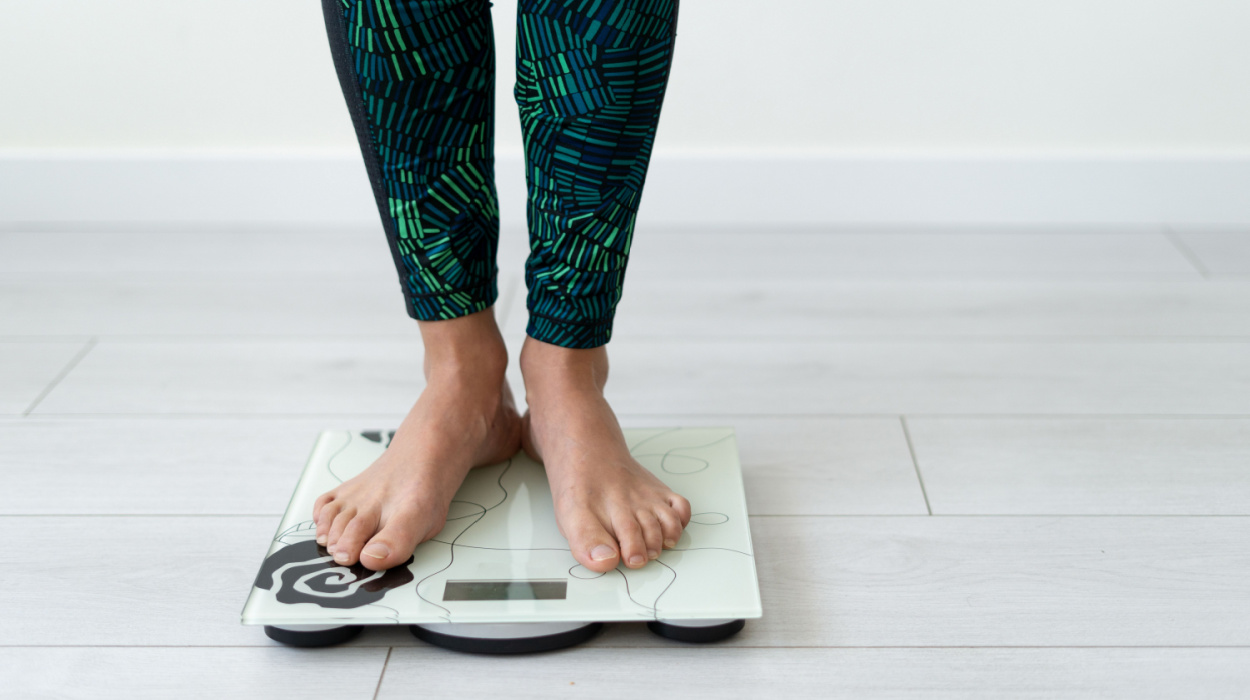Hashimoto’s is an autoimmune disorder that attacks and damages your thyroid gland. It’s the most common type of hypothyroidism, and studies show that it affects 5 out of every 100[1] Americans. Its prevalence is significantly higher[2] in women than men ranging from 4.8%-25.8% in women and .9%-7.9% in men.
Initially, Hashimoto’s thyroiditis has few to no symptoms, but they begin to intensify as the disease progresses. Some of the most common symptoms[1] of Hashimoto’s include:
- Brain fog.
- Weight gain.
- Constipation.
- Depression.
- Joint and muscle pain.
- Fatigue.
- Dry skin or thinning hair.
- Slowed heart rate.
Since the thyroid directly impacts your metabolism, it can be challenging to lose weight when you have Hashimoto’s disease. Keep reading this guide to learn how to lose weight with Hashimoto’s successfully.
How To Lose Weight With Hashimoto’s
10 weight loss tips for Hashimoto’s thyroiditis:
- Follow a Mediterranean diet.
- Follow your prescription.
- Eat foods rich in iodine, zinc, probiotics, and selenium.
- Avoid empty calories.
- Try a gluten-free diet.
- Try a dairy-free diet.
- Hit the gym.
- Try intermittent fasting.
- Find relaxation techniques.
- Drink adequate water.
10 Best Ways To Lose Weight With Hashimoto’s Disease

When your thyroid is inactive, your metabolism will slow down,[3] reducing the number of calories you can burn daily. This makes weight loss feel like an arduous task, but all is not lost.
Below is how to lose weight with hypothyroidism:
Follow A Mediterranean Diet
Ensuring that your meals are rich in lean proteins and fresh vegetables is one of the best ways to lose weight with Hashimoto’s. Protein is an essential part of a balanced diet, and a 2014 study[4] found it ideal for a weight-loss diet because it’s more satiating and thermogenic than carbohydrates. In fact, following a Mediterranean-type diet[5] has been found to have the most favorable influence on this autoimmune disorder.
In addition to these satiating proteins, your plate should be full of vegetables. Some of the most nutrient-dense vegetables include mushrooms, green beans, spinach, and leafy greens. Goitrogens from cruciferous vegetables such as cauliflower, bok choy, kale, and broccoli should be limited[6] until further studies define how much can be safely eaten to avoid further thyroid inflammation.
Vegetables are an essential source of fiber, which you need when trying to lose body weight. Dietary fiber helps reduce the risk of metabolic syndrome and promotes appetite suppression.[7]
Having these two essential food groups as part of your diet can help you consume fewer calories while still enjoying a balanced diet. This makes it easier to lose weight through a higher calorie deficit.
Follow Your Prescription
Unfortunately, you can’t cure Hashimoto’s. It is an autoimmune disease. Therefore, your doctor will prescribe medications to regulate your thyroid hormones. It’s important to take your medication as advised to ensure that your thyroid is working as it should, especially if you’re trying to lose weight.
Some medications like levothyroxine (T4) along with liothyronine (T3) have been found to have weight loss benefits.[8] Therefore, it’s essential to talk to your doctor about your weight loss goals if you have Hashimoto’s so they can prescribe the best medication combination.
Avoiding certain supplements[6] with your thyroid hormones is important. For example, calcium can decrease the absorption of thyroxine, so taking supplements four hours apart from your medication is important. Coffee and fiber should be avoided for one hour after taking your thyroid medication.
Eat Foods Rich In Zinc, Selenium, Probiotics, And Iodine
Zinc, selenium, and iodine work directly[9] with the thyroid, making them essential if you have Hashimoto’s disease.
Selenium helps the thyroid[10] function by recycling iodine. It’s also a good antioxidant. Ensure your diet includes selenium sources like tuna, eggs, brazil nuts, beef, legumes, and chicken. Selenium, zinc, and probiotics may be needed to fight[11] the oxidative stress seen in Hashimoto’s.
Note that it’s unnecessary to use selenium supplements because just one Brazil nut contains 95 mcg of selenium,[12] higher than the recommended 55 mcg daily allowance.[13]
Iodine is essential to thyroid function, but deficiencies are rare in the U.S. The only groups of people who are slightly susceptible to iodine deficiency are vegetarians and vegans.[14]
Iodine is found in iodized salt, so normally you don’t have to supplement it unless you are on a low-sodium diet. Ensure you buy iodized salt, as not all salt contains iodine.
On the other hand, zinc plays a crucial role[15] in producing thyroid hormones. Zinc deficiency primarily results from difficulty absorbing nutrients from food sources. For instance, you can have zinc deficiency if you have Crohn’s Disease or are a strict vegetarian.[16]
Some of the best food sources of zinc include beef, chicken, shellfish, milk, legumes, yogurt, and eggs.
Ensuring you get the nutrients above will improve your thyroid function and make it easier for your body to burn calories, boosting your weight loss efforts.
Avoid Empty Calories
Everyone enjoys the occasional sweet beverage, but it might not be the best drink if you have Hashimoto’s. While you don’t need to switch to extremely low-carb diets, you should avoid refined starches and added sugars.
These carbs are often called empty calories[17] because they have few nutritious benefits. You can find them in processed foods like salad dressings, sodas, granola bars, sauces, and sports drinks.
It’s also important to consider the potential adverse effect of artificial sweeteners like sucralose on your hypothyroidism because of a 2018 case study where it was found that these sweeteners worsened Hashimoto’s.[18]
Try A Dairy-Free Diet
If you have Hashimoto’s, there’s a 75% chance[19] that you’re lactose intolerant. Studies also show that lactose intolerance increases the need for T4 medication.[20] Restriction of lactose has been shown to decrease the levels of thyroid-stimulating hormone, thus decreasing potential thyroid inflammation and hormone dysregulation.
You don’t have to completely eliminate dairy as it is a source of calcium and vitamin D. Try using fortified milk alternatives, a lactase enzyme supplement, or low-lactose dairy like kefir and yogurt.
Try A Gluten-Free Diet
Gluten sensitivity was once thought to contribute to the progress[21] of Hashimoto’s disease. More recent studies suggest that such a restriction is not necessary for healthy adults without celiac disease.
Other recent studies suggest a high correlation[22] between gluten intolerance in autoimmune disorders like celiac disease and the incidence of Hashimoto’s thyroiditis. Studies show that 16% of celiac disease patients[23] have antibodies that attack the thyroid. Fortunately, eliminating gluten from your diet can reduce these antibodies[24] that may impact your autoimmune disorder.
Furthermore, an anti-inflammatory diet emphasizing vitamin D and other micronutrients mentioned earlier may be more beneficial than a gluten-free diet in autoimmune disorders.
Removing problematic parts of your diet, like dairy, inflammatory foods, and gluten, can help you have a healthier thyroid, which will help you burn more calories and lose weight quickly.
Hit The Gym
The best way to lose weight, regardless of health condition, is through a hypocaloric diet and physical activity. While it might be challenging to do high-intensity workouts when you have a metabolism problem like Hashimoto’s, studies show[25] that you can still get weight loss benefits from longer bouts of low-intensity exercise like walking.
So, instead of running yourself out of breath on the treadmill, you can start by walking 10,000 steps and see how effective it will be for weight loss.
You should also do some weightlifting exercises to help you increase muscle mass. Studies reveal[26] this can improve your metabolism and boost your weight loss efforts.
Try Intermittent Fasting
Intermittent fasting involves skipping meals or eating fewer calories for a certain period, then returning to your regular diet. You repeat this cycle in fixed durations as a routine.
For example, in the 5:2 intermittent fasting method, you fast twice a week and then eat an unrestricted diet for the remaining five days.
Intermittent fasting has been proven to be good for your metabolism,[27] which will help you burn calories faster if you have Hashimoto’s. When you do intermittent fasting, you consume fewer calories daily,[28] giving you a higher calorie deficit.
A study from 2022[29] analyzed participants who were using the 5:2 intermittent fasting method for 12 weeks. It revealed that the participants lost 9% more weight than those who used other weight loss methods. So, intermittent fasting is a practical and proven method to help you lose weight quickly.
Find Relaxation Techniques

There’s a strong relationship between stress and metabolism.[30] Therefore, if you have Hashimoto’s, you make your condition worse by being stressed. Any type of oxidative stress worsens Hashimoto’s disease.
It’s essential to find healthy ways of relieving stress to improve your metabolic health and make it easy for your body to lose weight.
While different relaxation techniques will have various results for different people, you can try some tried and tested stress-relief methods like mindfulness and yoga.[31]
Getting enough sleep is another crucial way to lower[32] stress levels and improve metabolism. If you have trouble sleeping at night, you can try cognitive behavioral therapy for insomnia,[33] like spending fewer hours in bed, limiting your screen time before bed, and changing negative thoughts about insomnia.
Drink Water
Hydration is an essential part of the weight loss process. If you’re not hydrating enough, your body might retain water, leading to water weight. Therefore, if you drink enough water every day, you’ll start losing weight[34] naturally.
Additionally, a 2013 study found that water stimulates metabolism,[35] which is vital if you have Hashimoto’s disease. Another study found that drinking water before a meal[36] can help you eat less food, resulting in lower calories.
Water is generally good for your health, and hydrating before and in between meals will help you lose weight faster.
Why Does Hashimoto’s Make It Difficult To Lose Weight?
Hashimoto’s disease is an autoimmune disorder where your body attacks the thyroid gland. The thyroid controls your metabolism, which is the process by which your body breaks down food and turns it into energy. Therefore, with an underactive thyroid gland, you burn fewer calories and need to implement strategies to optimize thyroid function and overall metabolism.
Risks And Safety Tips
Losing weight with hypothyroidism can be a nightmare if you don’t know how to manage it correctly. Below are some risks and safety tips for Hashimoto’s disease:
Risks
- Goiter: Hypothyroidism can lead to goiter,[37] an enlargement of the thyroid gland affecting function.
- Mental health problems: Approximately 50% of patients[38] with hypothyroidism have also experienced depression symptoms.
- Pretibial myxedema: Although infrequent, pretibial myxedema,[39] a form of dermatitis, can be found in patients with Hashimoto’s.
Safety Tips
- Stick to medication: Losing weight with Hashimoto’s disease requires your thyroid to function as actively as possible. Ensure you take prescribed medications and follow doctors’ recommendations — avoiding or delaying those foods and supplements that may interact with or affect absorption.
- Healthy diet and exercise: Diet and exercise are the best way to lose weight, even with Hashimoto’s disease. While you might not have the quick bursts of energy required for high-intensity interval training workouts, you can get similar benefits from doing low-intensity workouts for a long time.
- Join a support group: Chronic autoimmune diseases like Hashimoto’s can be difficult to accept and manage. Joining a support group can help you get emotional support and shared experiences.
When To See A Doctor
Generally, you should go for regular checkups if you have Hashimoto’s disease. However, if you follow the steps above and are still unsuccessful in your weight loss pursuit, don’t hesitate to speak to your healthcare provider.
A doctor can perform tests to check your thyroid levels and other hormones that could be preventing you from losing weight.
It’s always prudent to write down your symptoms before your doctor’s appointment to ensure you remember everything. You should also write down the weight loss efforts you’ve made in the past. This will help the doctor decide whether to prescribe a detox or other weight loss alternative.
Conclusion
Hashimoto’s hypothyroidism is a serious autoimmune condition that can prevent you from reaching your ideal weight. If treated with thyroid medication and lifestyle changes, you may be able to reduce body weight successfully. Hopefully, with the weight loss tips above, you now know how to lose weight with Hashimoto’s.
While losing weight with an underactive thyroid might take a long time, eating a healthy diet, working out, hydrating, and sticking to medication will help on your weight loss journey.
Frequently Asked Questions
You can improve your metabolism by eating zinc, iodine, and selenium-rich foods. Avoiding foods that cause chronic inflammation will help
Your diet should include probiotics, zinc, iodine and selenium. Proteins and vegetables are also essential if you want to lose weight. But the most effective diet is the Mediterranean diet or perhaps an anti-inflammatory diet.
To lose 20 pounds with hypothyroidism, you must use different weight loss strategies such as a healthy, low-calorie diet, intermittent fasting, exercise, stress reduction, and hydration. How long the weight loss will take depends on how healthy your thyroid is and your lifestyle modifications.
 Evidence Based
Evidence Based

